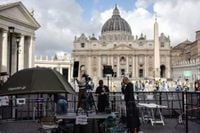On May 7, 2025, the conclave officially began at the Vatican, marking a significant moment in the Catholic Church as cardinals gather to elect a new pope. This event follows the traditional protocols that have been meticulously followed for centuries, ensuring a process that is both sacred and secretive.
At exactly 10:00 AM, a mass titled "Pro eligendo Papa" was held in St. Peter's Basilica. This mass serves as a solemn opening to the conclave, where the cardinal electors unite in prayer for guidance in their monumental task ahead. Following the mass, the cardinals participated in a ceremonial procession to the Sistine Chapel, which is the historic venue for papal elections.
As the afternoon unfolded, the atmosphere became charged with anticipation. The conclave is composed of 135 electors, including four from Poland, all of whom have pledged to maintain the utmost secrecy during the voting process. Once inside the Sistine Chapel, the cardinals are isolated from the outside world, with all forms of communication—including internet and phones—blocked. This isolation is enforced by a special Vatican security service, underscoring the gravity of their mission.
Before the voting commences, the cardinal electors take a solemn oath. They recite, "Et ego spondeo, voveo ac iuro. Sic me Deus adiuvet et haec Sancta Dei Evangelia, quae manu mea tango," which translates to, "And I promise, commit myself and swear it, so help me God and these holy Gospels, which I touch with my hand." This oath reinforces their commitment to confidentiality and the integrity of the election.
Voting procedures are precise and regulated. Each cardinal writes the name of their chosen candidate on a ballot marked "Eligo in Summum Pontificem," meaning "I elect Supreme Pontiff." Voting occurs twice daily, with the first ballot taking place on the same day the conclave begins. To elect a new pope, a candidate must secure a two-thirds majority, which amounts to 89 votes in this instance.
The process of elimination can be lengthy. If a candidate does not receive the necessary majority after several rounds of voting, the cardinals may pause for prayer and reflection. Historically, conclaves have concluded within two to five days, and there is hope that this election will follow suit.
As the cardinals cast their votes, the atmosphere is laden with both hope and tension. Each vote is carefully counted, and once a candidate achieves the required majority, the election is deemed canonically valid. The Cardinal Dean then poses two crucial questions to the elected individual: "Acceptasne electionem de te canonice factam in Summum Pontificem?" (Do you accept the election as Supreme Pontiff?) and "Quo nomine vis vocari?" (What do you wish to be called?).
If the response is affirmative, the ballots are burned in a stove, producing white smoke that signals to the world that a new pope has been elected. The iconic phrase "Habemus Papam!" (We have a pope) will be announced from the balcony of St. Peter's Basilica, marking the conclusion of the conclave.
The significance of Latin during this period cannot be overstated. As the official language of the Catholic Church, Latin is used throughout the conclave, from the initial mass to the final announcement of the new pope. Phrases such as "Extra omnes!" (Everyone out!) signify the moment when non-electors must vacate the Sistine Chapel, ensuring that the election remains confidential.
Latin phrases like "Annuntio vobis gaudium magnum: habemus Papam!" (I announce to you a great joy: We have a pope!) have become synonymous with this momentous occasion. This tradition dates back centuries, with the formula evolving over time yet retaining its core essence. The announcement itself is a moment of jubilation, echoing through the square as faithful gather to witness the new pontiff's first appearance.
Historically, the conclave has been a pivotal moment in the Church's life, often reflecting broader social and political contexts. The last few conclaves have seen a variety of outcomes, with some resulting in swift elections while others have stretched on longer than anticipated. The dynamics among the cardinal electors play a crucial role in the speed of the election process, with consensus building being essential.
As the conclave unfolds, the world watches closely. The selection of a new pope not only impacts the Catholic Church but also resonates with millions of believers across the globe. Each papal election carries the weight of tradition, expectation, and hope for the future of the Church.
In summary, the conclave that began on May 7, 2025, is a profound moment in the life of the Catholic Church. With 135 electors gathered in the Sistine Chapel, the process is steeped in tradition and solemnity, reflecting the deep significance of choosing a new leader for the global Catholic community. As the cardinals proceed with their voting, the anticipation grows for the moment when a new pope will emerge, heralding a new chapter in the Church's history.

